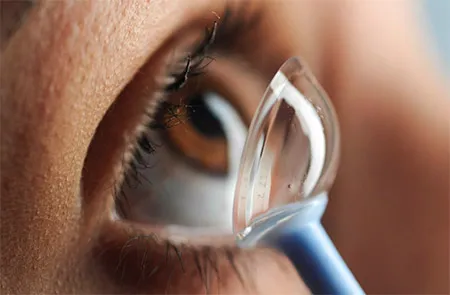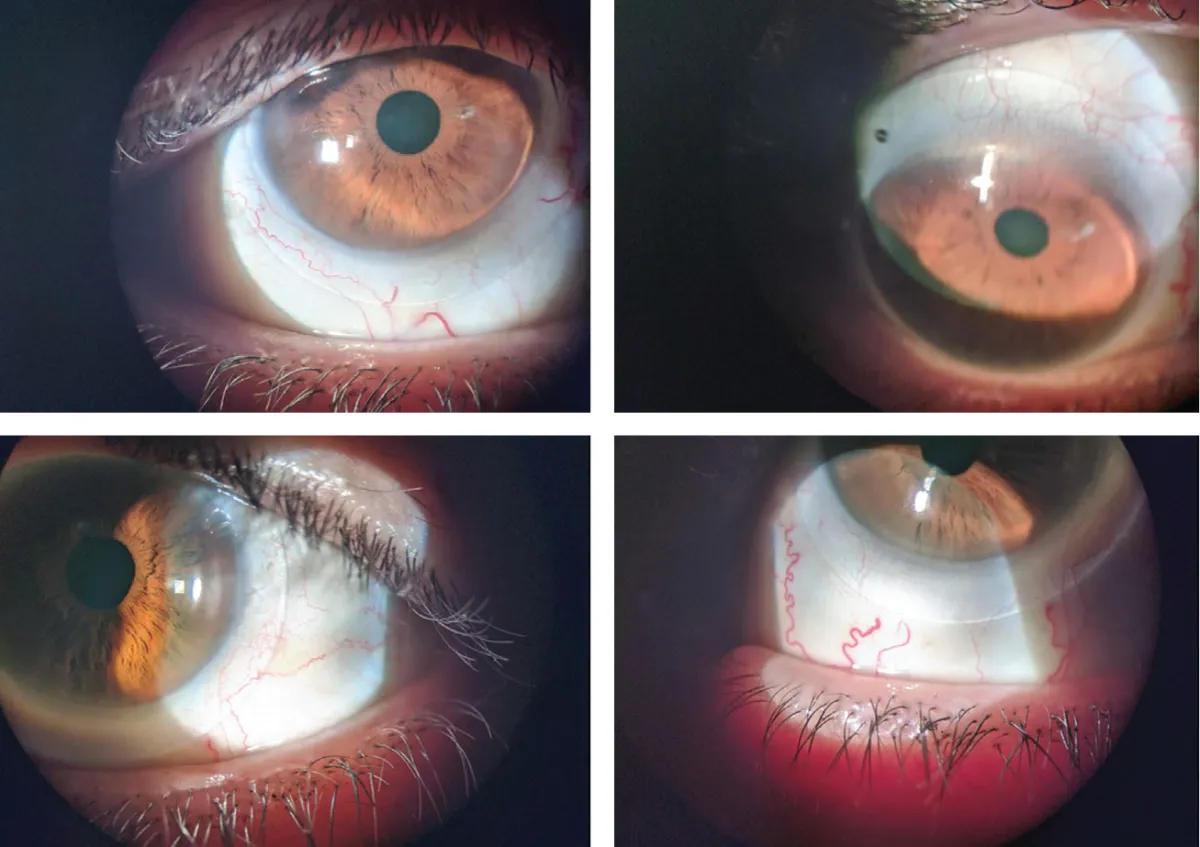Contact Lenses
Specialty Contact Lenses:
Your Ultimate Guide
Specialty Contact Lenses: Your Ultimate Guide
FSDAVCFEBFEVSDDVFSD
FSDAVCFEBFEVSDDVFSD
FSDAVCFEBFEVSDDVFSD
Why Specialty Contact Lenses?
Specialty contact lenses offer tailored solutions for individuals whose vision needs surpass the capabilities of standard contacts. These lenses cater to a variety of complex visual challenges, such as severe astigmatism, keratoconus, or presbyopia, providing customized optical corrections that traditional lenses cannot achieve.

Specialty contact lenses offer tailored solutions for individuals whose vision needs surpass the capabilities of standard contacts. These lenses cater to a variety of complex visual challenges, such as severe astigmatism, keratoconus, or presbyopia, providing customized optical corrections that traditional lenses cannot achieve.
Today, we’ll look at exactly what makes these lenses not only different but essential for specific individuals, offering insights into how they enhance both vision and quality of life for those with specific eye health needs. Here’s everything you need to know about specialty contact lenses
Today, we’ll look at exactly what makes these lenses not only different but essential for specific individuals, offering insights into how they enhance both vision and quality of life for those with specific eye health needs. Here’s everything you need to know about specialty contact lenses

What are Specialty Contact Lenses?

Specialty contact lenses are designed to address unique vision challenges that standard contacts cannot, catering specifically to conditions like astigmatism, keratoconus, and presbyopia. Toric lenses are tailored for astigmatism, providing precise curvature to correct the irregular corneal shape, ensuring clear and stable vision.
Scleral lenses cover a larger area of the eye, beneficial for keratoconus patients by creating a smooth optical surface, enhancing both vision and comfort. Multifocal lenses allow for multiple vision fields, aiding those with presbyopia by providing clear vision at various distances. Individuals with these specific optical needs find that specialty lenses offer significant improvements in vision clarity and comfort, making them a preferred choice for managing complex vision issues.
Specialty contact lenses are designed to address unique vision challenges that standard contacts cannot, catering specifically to conditions like astigmatism, keratoconus, and presbyopia. Toric lenses are tailored for astigmatism, providing precise curvature to correct the irregular corneal shape, ensuring clear and stable vision.
Scleral lenses cover a larger area of the eye, beneficial for keratoconus patients by creating a smooth optical surface, enhancing both vision and comfort. Multifocal lenses allow for multiple vision fields, aiding those with presbyopia by providing clear vision at various distances. Individuals with these specific optical needs find that specialty lenses offer significant improvements in vision clarity and comfort, making them a preferred choice for managing complex vision issues.

Additionally, these lenses often feature advanced materials and designs that enhance breathability and moisture retention, further improving wearability for individuals with sensitive or dry eyes. This comprehensive approach ensures that users experience not only better vision but also greater overall eye health and comfort.
Scleral lenses cover a larger area of the eye, beneficial for keratoconus patients by creating a smooth optical surface. Multifocal lenses allow for multiple vision fields, aiding those with presbyopia. Individuals with these specific optical needs find that specialty lenses offer significant improvements in vision clarity and comfort.
Types of Specialty Contact Lenses and Uses
Specialty contact lenses are tailored to address distinct vision issues. Toric lenses are designed specifically for astigmatism, featuring a unique shape that corrects the uneven curvature of the eye to provide clear vision. Scleral lenses are beneficial for those with corneal irregularities such as keratoconus; these larger lenses vault over the cornea, offering a smoother surface that improves vision.
Multifocal lenses cater to presbyopia by providing different lens powers for seeing at various distances, aiding in a smooth transition between viewing zones. Each type is crafted to enhance visual accuracy and comfort for specific conditions.
The Benefits of Specialty Contact Lenses
Choosing specialty lenses can significantly improve the quality of life for individuals with specific ocular conditions. These lenses offer enhanced visual acuity, ensuring that users see more clearly and distinctly, which is crucial for daily activities.
Greater comfort is another pivotal benefit, as these lenses are tailored to fit the unique contours of each user’s eyes, reducing irritation and increasing wear time. Additionally, they promote better eye health by providing appropriate corrective measures that minimize strain and the risk of complications associated with improper vision correction.
Moreover, specialty lenses can cater to unique visual needs, such as those required for specific professions or hobbies. For instance, individuals who spend significant time in front of digital screens can benefit from lenses designed to reduce digital eye strain and blue light exposure. Similarly, athletes can use specialty lenses that improve contrast and reduce glare, enhancing their performance. By addressing these specific requirements, specialty lenses not only improve vision but also contribute to better productivity and enjoyment in various activities.
How Specialty Contact Lenses Are Fitted?
The fitting process for specialty lenses is highly personalized to ensure both optimal vision correction and comfort. This process begins with a detailed examination of the eye's structure and a thorough assessment of the individual's specific vision needs.
Advanced imaging techniques are often employed to map the surface of the eye with precision, ensuring that the lenses are customized to the unique contours of each cornea. This meticulous approach helps in achieving the best possible fit, reducing discomfort, and maximizing the effectiveness of the lenses in correcting vision.
Additionally, the fitting process includes multiple follow-up visits to fine-tune the lenses, making necessary adjustments to enhance comfort and visual acuity.

The fitting process for specialty lenses is highly personalized to ensure both optimal vision correction and comfort. This process begins with a detailed examination of the eye's structure and a thorough assessment of the individual's specific vision needs.
Advanced imaging techniques are often employed to map the surface of the eye with precision, ensuring that the lenses are customized to the unique contours of each cornea. This meticulous approach helps in achieving the best possible fit, reducing discomfort, and maximizing the effectiveness of the lenses in correcting vision.

Additionally, the fitting process includes multiple follow-up visits to fine-tune the lenses, making necessary adjustments to enhance comfort and visual acuity.
This ongoing care and customization ensure that patients receive the most effective and comfortable vision correction possible. The commitment to precision and personalization in fitting specialty lenses results in superior outcomes and improved quality of life for those with complex vision needs.
This ongoing care and customization ensure that patients receive the most effective and comfortable vision correction possible. The commitment to precision and personalization in fitting specialty lenses results in superior outcomes and improved quality of life for those with complex vision needs.
Maintenance of Specialty Lenses
Proper maintenance is crucial for preserving the effectiveness and extending the life of specialty lenses. Always clean and store the lenses according to the specific instructions provided, using recommended solutions to avoid damaging the lens material.
Regular cleaning prevents the build-up of deposits and bacteria, which can affect vision and eye health. It’s also important to adhere to the replacement schedule advised by your eye care professional to ensure optimal lens performance. Regular check-ups help adjust care routines, catch any issues early, and maintain the best lens condition.
Are Specialty Contact Lenses Right for You?
If you're considering specialty lenses for your unique vision needs, consulting with experienced eye care professionals is crucial. The team at Kleinwood Vision is equipped to determine the best specialty lens options for you. Don’t hesitate to reach out and explore how these advanced lens solutions can enhance your vision and quality of life.

Contact Info
Hours of Operation
Mon - Fri | 9:00 AM - 5:00 PM
Sat - Sun | Closed
Holiday Hours: We are closed for the following holidays: New Years Day, Memorial Day, Independence Day, Labor Day, Thanksgiving Day, Christmas Day
© 2026 Kleinwood Vision. All rights Reserved.


